Origin 2022: NRLW players need to be seen as an investment for the future of the game
Parramatta Eels star Tiana Penitani juggles work, study training and a second job. She shares her story and calls out the biggest mistake anti-parity critics make.
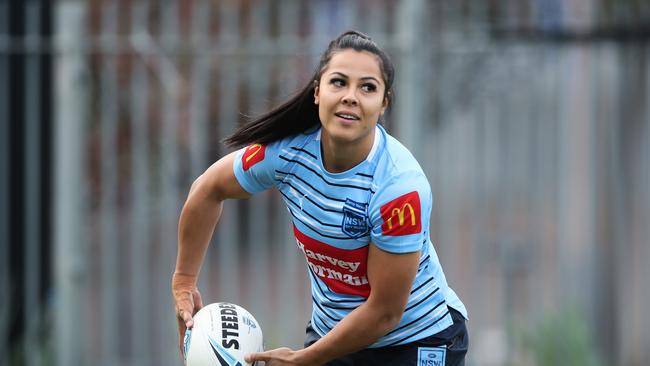
NRLW
Don't miss out on the headlines from NRLW. Followed categories will be added to My News.
Parramatta’s Tiani Penitani is one of the NRLW’s star players. But she is forced to work two jobs to top up her rugby league income, studies and pays for things like her own gym membership and health insurance.
Which is why she has challenged the NSWRL to increase women’s State of Origin pay to reach parity with their male counterparts.
Penitani, who has twice represented NSW, believes women players should be paid $15,000 an Origin game – the same as their male counterparts – to help “put food on the table and pay the bills.”
The Queensland Rugby League last week announced that their women’s Origin squad would next season be paid the same amount as the Maroons’ men.
That decision ignited debate about pay parity
Currently, female NSW players are paid $6000 per Origin appearance — $4000 for playing and $500 for each training session. The NSWRL is expected to increase that figure to $10,000, possibly $12,000, when the board meets early December.
Watch every game of the Weber WBBL Live & On-Demand on Kayo or catch up for FREE with minis on Kayo Freebies. Join Kayo Now >

Penitani, 25, works as a beauty therapist and in customer service while training and playing.
“It’s really positive there is a debate around pay parity and, in my opinion, that’s where the women’s game needs to be,” Penitani said. “And I know the playing group has felt that way for a little while now.
“We’re feeling the effects of being a part-time athlete in a growing game and we need to look after our players if we want the momentum to continue. The men are fortunate enough to be in full-time roles as professional athletes and that’s what we aspire to be in the near future.
“I think we deserve that because we put in the exact same effort, if not more. We’re juggling jobs, Personally, I’m studying, working two jobs and I also train full-time at my own expense. My gym membership comes out of my own pocket, my health fund comes out of my own pocket.
“I am essentially putting in triple the amount of work – if you’re including work life – and trying to be a professional athlete without the professional athlete remuneration. If we want the game to keep growing then someone is going to have to put their foot forward and support that.
“I don’t have kids but there are women in the game that have children and work full-time while managing to get to the gym almost every day. Can you imagine if we were remunerated for the effort that we put in?
“Who is going to open the door to women, giving them the opportunity so they don’t have to work two jobs, put food on the table and pay the bills? We’re in two completely different situations financially.”
The Daily Telegraph revealed the men’s State of Origin side pulls in $5 million in sponsorship annually, while the women’s one-off game attracts a little more than $100,000.
“The women’s game needs to be seen as an investment,” Penitani said.
“I understand there is a big argument around revenue equalling the amount of pay you get.
“But if we don’t invest in all areas of rugby league then we wouldn’t have grassroots, we wouldn’t have the elite pathways. The mindset needs to be shifted away from the revenue equals pay argument and be seen more as an investment.”
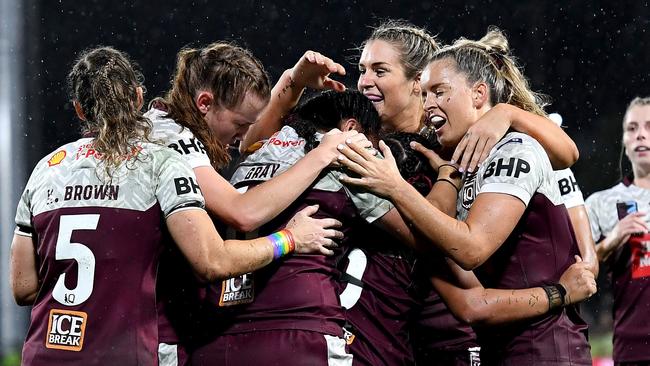
There are calls to expand the women’s Origin series to three games to leverage its increasing popularity and potential commercial revenue. When the men’s remuneration returns to $30,000 — the pre-Covid figure factored into the game’s CBA — equal pay means the NSWRL would need to find another $1.5 million for the women.
Former NSWRL COO Stuart Clark suggested on Tuesday that men’s Origin players could be prompted to cop a pay cut to ensure pay parity with the women.
“Being a current player, and being in the middle of this, and feeling the effects of how difficult it can be to maintain a professional standard, which is where the women’s game is, and also having to pay bills, I agree with what the QRL has done, I think it’s amazing,” Penitani said.
“These conversations are being had for a reason. It’s where the women’s game is now. The only way we can implement that kind of change is to talk about it and for it to be a hot topic
“This could be win-win. You’d have a happy playing group that felt respected and listened to and who were given the chance to invest and make the game better. That’s the only way the game is going to get better, if the female playing group is listened to.
“We’re not asking for $200,000 salaries. I understand that will come over time. Right now we are asking for the bare minimum because there is such an expectation on our shoulders right now.”
Former NSW five-eighth Jamie Soward, now coaching St George Illawarra’s NRLW side, added: “I think the women should get equal pay based on the product they have sold over the last couple of years.
“But if you and I go to the pub together and you’ve got $100 to spend and I’ve only got $80, where do I find the extra $20? Not everyone’s budgets are the same. We have to be realistic as well. I think we all have to be measured in our approach and be patient.
“I’ve got two young girls and I want them to earn as much as they can if they decide to play rugby league.”
EQUAL PAIN: WILL NSW MEN TAKE A PAY CUT?
A former senior rugby league official has canvassed the possibility that male NSW State of Origin players could be prompted to cop a pay cut to ensure rugby league reaches pay parity with women.
And Stuart Clark – the ex-NSWRL chief operating officer and former general manager of the Sydney Sixers Big Bash franchise – believes sports women should be paid equal to men.
Clark does hold fears though that sporting organisations trying to scramble to secure substantial new funding for women could risk going broke.
The NSWRL is expected to increase match payments to female State of Origin players from next season after the QRL last week announced female players would receive the same $15,000 a game payment as men.

An expanded women’s Origin series could cost the NSWRL an additional $1.5m should women receive equal pay once the men’s remuneration reverts back a pre-Covid payment of $30,000 a game.
“To make it work financially, and to pay women equally, my understanding would be that the sports either increase funding, which I can’t see happening at the moment, increase corporate and television revenue or the men having to give up some money. That’s the only way I can see it happening,” said Clark, a lawyer and former Test fast bowler.
“The same thing would apply in cricket. Cricket made a $40m loss last year. Yes, we all agree with parity and payments but there’s also the question about how do you fund it? Do the guys have to cut a pay cut?
“We agree with the premise but there’s only a certain amount of money in the pool, whether it be cricket, rugby league, union or soccer. No sport is flush with money after the Covid crisis and everyone understands that.
“Maybe men have to take a pay cut. Is that the way you have to frame it to make it all work? I can’t see the NRL giving the playing group more money.
“When we have these discussions, the questions for the governing bodies is: How do we fund it? We can’t allow cricket, rugby league and AFL to send themselves broke – that can’t happen. It puts it back onto the players associations to fund better deals.”
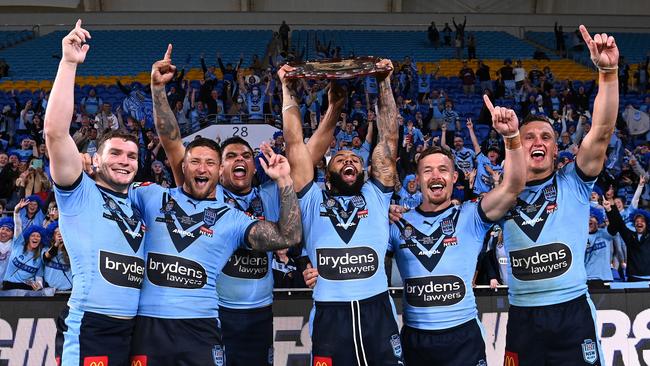
Clark is a supporter of women receiving increased pay which draws alongside men.
“Should women get paid on parity? Yes. I want to make it clear that I think the female game should be paid equally. I’m all for it so it’s now up to the game and players to find ways to make it work,” Clark said.
“But does the game have the money to provide for the women’s game or will the male participants have to take a pay cut? In the context of player payments, the sports can only afford so much. It’s a question of how do you financially make it all work?”
Aware of the sensitivities around the issue, one NRL CEO, who did want to be named, said: “The men support the woman’s game, no doubt. But I wonder whether that support might wane if it actually hurts them in their hip pocket.”
NSW players did accept a pay cut during Covid to ensure all NRL players were paid.
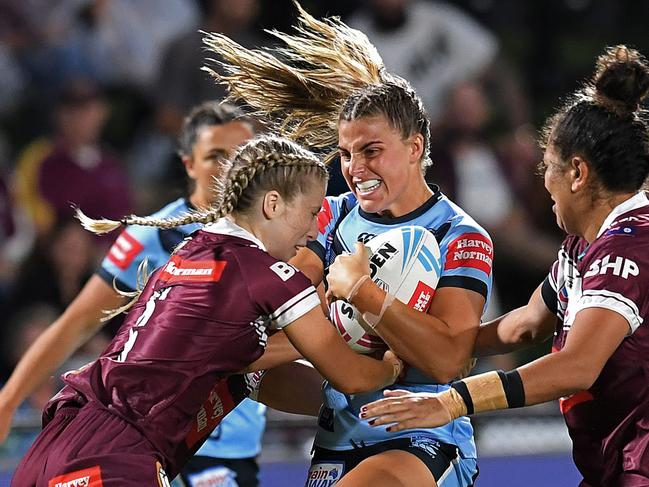
As reported by News Corp on Tuesday, one NRL club commercial manager – who predicted sponsorship funding for State of Origin – believes the men’s series would pull more than $5m annually, the women’s one-off game would attract little more than $100,000.
RLPA CEO Clint Newton said it was important to establish a collective bargaining agreement for the women’s game.
“First of all, we have to agree on collective terms for the women,” Newton said. “That’s fundamental. Forget just working out pay. It’s about establishing a collective bargaining agreement that gives women certainty and a clear pathway forward.
“Receiving payments, entitlements and benefits are all factored into that but ultimately that falls under a CBA and we don’t have that, which is why it is important for us moving forward. Like always, when it comes to allocation and distribution of player generated revenues, we will consult with the players – male and female – and particularly our leaders, before landing on a position.”
Reminded that the extra funds had to be found, Newton said: “Everyone is aware of the importance of continuing to grow and advance the NRLW. We will focus on understanding what revenue is being generated, the distribution amounts to the major stakeholders and securing the best outcomes for our members.”
Female NSW players receive $6000 a game – $4000 for playing the game and an extra $500 for each training session. The NSWRL board will consider increasing those payments to $10,000, maybe even $12,000, at their December board meeting but will almost certainly fall short of matching the men’s $15,000 a game remuneration.
Male State of Origin players were paid $30,000 a game before that figure was cut in half over the past two years due to Covid cut backs. The QRL’s decision to pay women $15,000 a game blindsided the NSWRL and NRL.
“Maybe Queensland are dipping into their pocket to pay,” Clark said.
The NSWRL pays the players match payments funded by the NRL.
NSWRL COMES TO PARITY PARTY
The NSWRL is expected to significantly increase match payments to female State of Origin players from next season – but there are future concerns about an unsustainable $1.5m outlay.
NSWRL directors – including chairman George Peponis, Roosters supremo Nick Politis and former Parramatta director and player Geoff Gerard – will meet next month where the issue around women’s pay will be heavily discussed following the QRL’s decision to lift their player payments to $15,000 a game, equal to men.
Female Blues players currently receive a total of $6000 a game – $4000 for playing the match and an additional $500 for each training session.
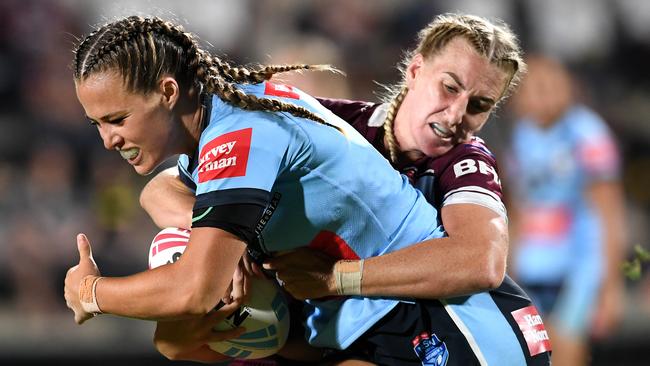
It is understood the NSWRL board will consider increasing those payments to $10,000, maybe even $12,000, but will almost certainly fall short of matching the men’s remuneration, also $15,000 a game.
While rugby league management is fully supportive of a pay rise for women playing Origin, there are financial fears about possible future increases to equal the men.
Male State of Origin players were paid $30,000 a game, a figure which has been slashed by half over the past two years due to Covid cut backs.
There would seem an inevitable looming push for the men’s pay to revert back to $30,000 a game – a figure clearly stated in the game’s Collective Bargaining Agreement – now that Covid restrictions have eased.
Should women also demand equal pay – and their series expands from one to three games within the next two to three years, as has been mooted – then the NSWRL would need to find another $1.5m for parity.
“That would be another $90,000 a player over three games. Where would the game find that money?” said one official.
There is a general acceptance that women should be paid more but there is also a theory the game could not possibly afford to outlay $1.5m for men and another $1.5m for women.
One NRL club commercial manager – who predicted sponsorship funding for State of Origin – believes the men’s series would pull more $5m annually, the women’s one-off game would attract little more than $100,000.
The NRL and NSWRL were blindsided by Queensland’s announcement last week revealing a pay increase for women to equal the men. The NRL issues funding each year to the NSWRL, who pay the players.
“I think there is a need to increase the money but it hasn’t yet been discussed at board level,” said Peponis, the former Canterbury and Australian captain. “We will discuss it at our upcoming board meeting.
“We will look at what is fair and reasonable, but I think there is a place to ‘up’ the women’s income, especially when they are missing work or are out injured.
“Increasing to what level, that has to be budgeted. But all that has to be considered by the board and we will have a look at it.
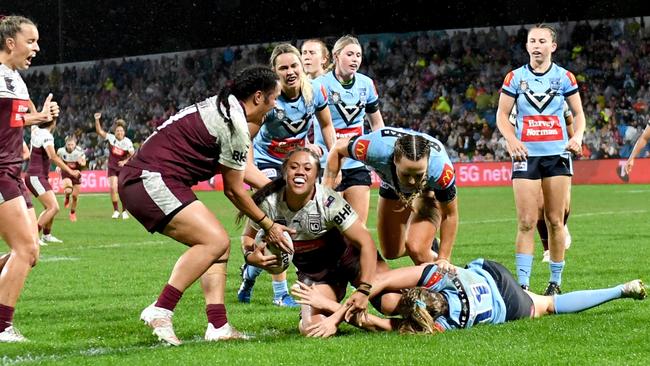
“The women certainly don’t get paid anywhere near what the men are getting. There are a lot of factors to look at.”
Another club official did point out that NSW and Queensland have been competing at men’s level for 113-year, and securing ongoing commercial development, while the women have only been playing Origin football for four years.
Queensland’s initial 30-player squad next year will be paid $4000 each. That squad will then be reduced to 19 players, who will receive another $7000. The final 18 players who play the game on June 24 will be remunerated a further $4000.
Last week, Maroons captain Ali Brigginshaw said: “I think it‘s a big step from the QRL to make sure we’re aligned with the men’s team for the first time.“
The NSWRL may not reach a final decision on any potential pay increase until its January meeting.
EQUAL PAY DEAL IGNITES PUSH FOR EXPANDED ORIGIN SERIES
On the back of the landmark announcement regarding equal pay for both men’s and women’s Maroons players, the Queensland Rugby League is now working towards a three-game women’s Origin series.
The QRL has begun early discussions into expanding the women’s Origin series to two games in 2023 and then eventually to three games after that. It follows calls to expand the women’s Origin series, which is currently just battled out in a single 80-minute clash.
Maroons women’s coach Tahnee Norris described it as “a conversation that needs to be had”.
“Today’s announcement makes a really big difference,” Norris said of the equal pay deal (details below).
“If we went to a three-game series too early, we wouldn’t have been able to get the players for those three games because it would have too much pressure on them work-wise to commit to that sort of thing.
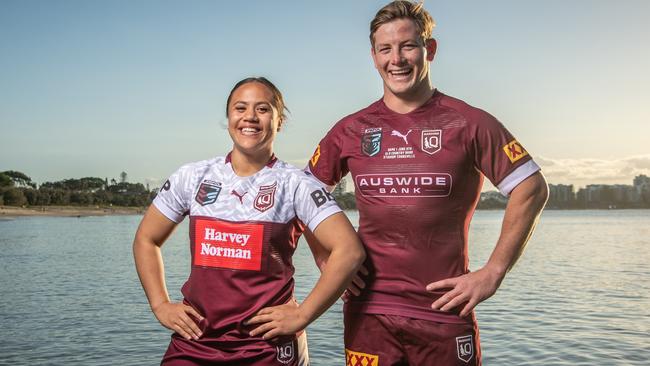
“It’s a real conversation to have now.
“We really want to go to that three-game series. We can afford to do that now.
“The girls can take the time off work because we can compensate them.
“That’s definitely the conversation that needs to be had.
“We’re definitely pushing for it and it’s something we need to go to. The girls deserve to go to three games. The quality of the game is there and they want to play three games so we really need to look at it.”
QRL CEO Rohan Sawyer said there had been early discussions into growing the blockbuster Origin series.
“We are in discussions about expanding the series,” Sawyer confirmed on Thursday.
“Next year is a big year with two NRLW seasons, a State of Origin and probably a World Cup at the back end so it’s unlikely it will happen for next year.
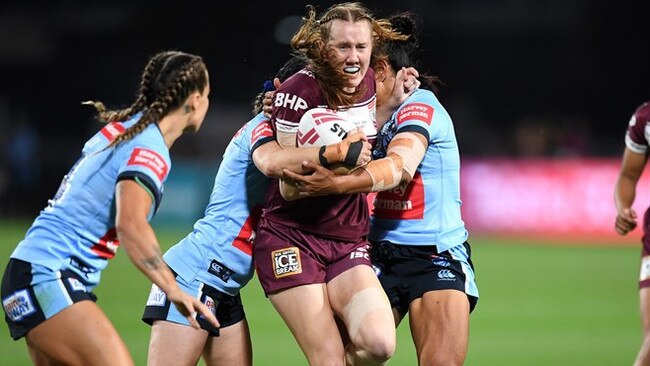
“We’re looking at 2023 and how we expand that to potentially two games then ultimately three games. Our view is that if we move to an expanded series, we’ll look to pay our players and staff to make sure they’re remunerated for the work that they do.”
Queensland great Ali Brigginshaw also welcomed the idea.
“I’d like to play three,” Brigginshaw said. “I love the game of Origin.
“It’s the best and the hardest game you will ever play, and anyone who plays the game will say that. The step is to three (games). We’re happy to be playing this game and we will see what the future holds.”
Origin equal pay: Landmark day for women’s sport
The Queensland female rugby league team will be paid the same as their star male counterparts, such as Maroons skipper Daly Cherry-Evans, in a $325,000 coup in the push for women’s equal-pay rights.
In a landmark moment for Australian sport, the Queensland Rugby League have become pioneers in smashing the payment ceiling, striking a deal that will see their female Maroons players receive $15,000 each for next year’s Origin series.
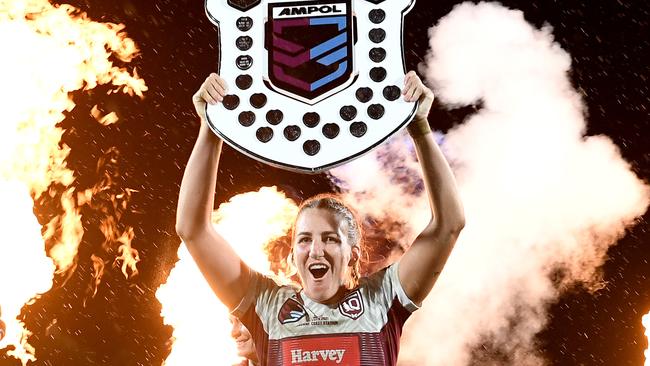
Queensland women’s Origin stars such as Ali Brigginshaw, Destiny Brill and Tallisha Harden will enjoy the same match fees given to the QRL’s male superstars, headlined by Maroons captain Daly Cherry-Evans, Cameron Munster and Harry Grant.
The push for sportswomen to receive the same financial rewards as their male counterparts is a global, emotive and polarising debate in world sport — and the Queensland Rugby League is leading the charge for better pay days for females.
Equal Origin remuneration is a first for the game, and is an outcome driven by the QRL’s continued investment into women’s rugby league.
The ARL Commission has been involved in the groundbreaking pay discussions that will see Queensland’s elite female rugby league talent celebrate the biggest pay day of their careers when they face the Blues next season.
Maroons male skipper Cherry-Evans backed the decision to increase financial support for female players.
“What this shows is that there’s a really strong progression coming in the women’s game,” he said. “It’s only natural that we keep giving our female players the opportunity to spend more time away to grow the game they love.”
QRL chief executive Rohan Sawyer said the equal Origin remuneration was a “milestone moment” for the game in Queensland.
“This is about creating certainty and stability for aspiring Maroons to have the opportunity to come through a genuine career pathway within the female game,” Sawyer said.
“We have identified the commitment the players make to the Maroons by being part of the top squad through to June, and over this time we want to adequately remunerate them for their commitment.
“We’re really proud of the fact that we’ve made the decision to invest now. I’ve got no doubt that there are many people and organisations within the game and other sectors who have the intentions to continue to invest in women’s rugby league, but we are intent on making decisions that accelerate this.”
Sawyer also acknowledged the role the ARLC and NRL have played by providing funding to the QRL to increase financial opportunities for female participants.
Under the payment plan, a Queensland squad of 30 players will be selected and contracted to the QRL for a series of camps ahead of the 2022 Women’s State of Origin.
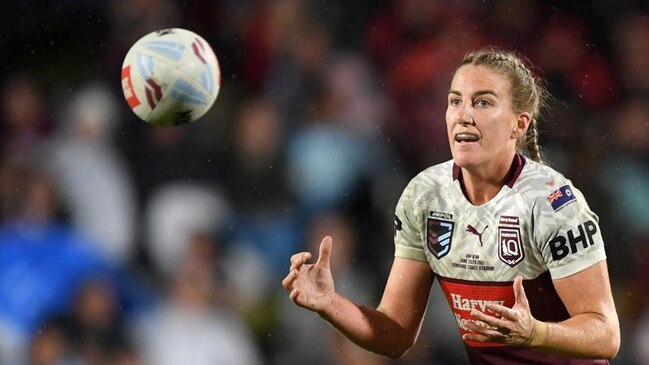
Each of the 30 squad members will receive a first-up payment of $4000 to compensate them for the time they may need to take off work to train, travel and undertake their recovery requirements.
A further $7000 payment will be made to the 19 players who are selected to take part in the final camp leading into the State of Origin game on June 24.
The 18 players selected in the team to play New South Wales then receive a $4000 match payment, bringing their total windfall to $15,000.
Queensland women’s captain Brigginshaw welcomed the QRL’s equal-rights financial movement.
“It takes the pressure off when you go to represent your state, the pressure of being away from your families and your jobs,” Brigginshaw said.
“You’ve got a job to do with the Maroons and you go and do it, knowing that you’re fully supported by the QRL. I think it’s a big step from the QRL to make sure we’re aligned with the men’s team for the first time.”




